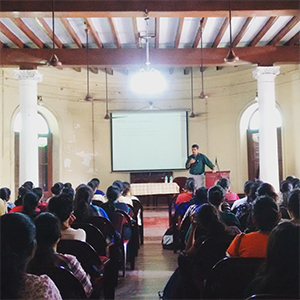
Dr. Sridhar Vaitheswaran explains how supporting a person with dementia effectively in a dementia friendly community can improve not only their wellbeing but also improve caregiver satisfaction, decrease burden and contribute to the society’s progress.
The story of Mr Arun
Mr Arun is a seventy-year old retired government employee. He lives with his wife, son, daughter-in-law and two grandchildren in Chennai. He helps with the chores such as shopping and paying bills. He also visits a temple near his house every day and has been helping the temple committee with managing accounts. Once after a routine morning walk he did not return home. His family was worried and tried calling him but he had left his mobile phone at home. They filed a missing-person report in the local police station. He was found the next day near the government quarters where he used to live when he was employed. He appeared very distressed and was taken by the family to the hospital.
The family revealed to the doctors in the hospital that he had been increasingly forgetful over the previous year. He had been misplacing his wallet, phone and spectacles, and would often search for them everywhere. On many occasions, he had been to the shops but had returned without buying the items that he needed to as he had forgotten. There were problems with his bookkeeping in the temple as he was having difficulties with his calculations. The authorities in the temple had relieved him of his responsibilities. He did not make a fuss about this and his family ignored these issues as problems associated with becoming older. He was however diagnosed in the hospital with dementia due to Alzheimer’s disease after some tests.
Unfortunately, his problems did not end here. His family, naturally, became overprotective and did not allow him to go out as much as before. Even then, he would sneak out for a walk in the nearby park or a visit to the bank to check on his pension account. During one such visit to the bank, he could not take money out of his account. He did not know which forms to fill and the cashier refused to hand him money. He felt indignant and refused to leave without his money. Arguments between him and the cashier became increasingly nasty. The security in the bank was called and they had threatened to report him to the police for creating a ruckus in the public place. The son was called to the bank. The family was chided for being “careless” and letting him out of the house. The son was advised to lock Mr Arun in the house or place him in a lunatic asylum to avoid such events in the future. The daughter-in-law, who worked as a teacher, decided to resign from her job to take on the role of a full time caregiver. The family kept Mr Arun confined to the house, much to his chagrin. His condition had been deteriorating rapidly.
As one can see in the above story, which is real, with names and circumstances changed to maintain confidentiality, there are many issues which persons with dementia and their families face. The prevalent systems of belief in our society conceptualise an illness as a personal issue. The responsibility for caring for this illness falls on the individual suffering from the illness to a certain extent and on the families to a larger extent. The community in which the person has lived and has contributed to all his life assumes very little responsibility towards this person who is now ill. Such a standpoint will work in acute illnesses where the person suffering has to undergo a short period of infirmity and after recovery everything returns back to “normal”. Unfortunately, for chronic illness such as dementia, this model will not fit. The individual does not “recover” to assume their previous roles in the society.
Burden on the family
It is not uncommon to see that the family has to make significant adjustments to meet the person’s needs and also to ensure that the community is not affected by this person’s problems. Families cannot cope with this burden in the long term. Also, such a model with families completely absorbing all the needs of the person with dementia would not be of much concern to a community if it were a rare event. However, as the prevalence of the condition increases, and as more and more families face the problem of being solely responsible for meeting the needs of persons affected, the overall societal burden increases. This, in turn, has an adverse effect on society.
The society has to act on its responsibility towards its members. It has to make certain adjustments to accommodate those with the condition. The need for the society to act should not be driven just by these reasons alone. From the legal and human rights perspective, it is important to remember that those with dementia have equal rights in the society for their basic needs to be met.
Unfortunately, our society has been largely ignorant of the sufferings and the needs of those with dementia and their families. Stigma against dementia has influenced the attitudes of the society as well.
Dementia friendly community
While we need to plan for better health care solutions for those with dementia, our responsibility does not end with this. We need to focus on providing better support for those with dementia and their families. In addition, we should also address the challenges that those with dementia and their families face in their interface with the community. One solution is the creation of dementia friendly community in which the person with dementia is empowered and supported by the community in such a way that they can meaningfully participate in activities that are important to them. This can improve their quality of life and also help the families lead a near-normal life without the fear of being judged or stigmatised by the community.
What makes a dementia friendly community?
Every aspect of the community that the persons with dementia and their families will need to interface with should be prepared to be ready and accepting of their needs. It begins with better awareness about dementia in the community. As the level of awareness grows every member in the community does what they can to make it easier for the person with dementia to navigate through the community in their day-to-day lives. Be it the shop keeper who takes more time to deal with a customer with dementia trying to work out the exact change or the official in the bank who can understand that the person with dementia may struggle to complete the correct forms to access money in their accounts. The more essential the service is for the person with dementia, the more important it is for that service to become more dementia friendly.
While it is important for the personnel in the services to be aware of dementia and how they can contribute, it is absolutely essential that the physical structure of that service should be made accessible for the person with dementia. As is often the case, most persons with dementia are elderly and being elderly comes with challenges in mobility, vision, hearing, and increasing frailty. Better infrastructure with leveled pavements, low-floor buses, railings in public buildings, elder friendly toilets, and many more adaptations would go a long way in improving accessibility not only for those with dementia but also those with other disabilities.
The two important requirements of any good dementia friendly service are to keep the physical structure accessible and to make the human interactions easy. This will ensure that the person with dementia can access the service they need without having to depend on others.
There are many good examples of dementia friendly communities in action. A recent publication by the Alzheimer’s Disease International (ADI) on dementia friendly communities highlights many such examples in India and abroad. The Alzheimer’s and Related Disorders Society of India (ARDSI) has organised workshops and suggested frameworks for developing such communities in India.
Related Reading: Dementia Friendly Communities offer Support to People with Dementia
We, from Dementia Care in SCARF (DEMCARES), have initiated the “Dementia Friends” programme wherein we raise awareness about dementia among college students by a series of talks and then offer a volunteering programme in which the student is paired with a person with dementia for a period of six months. The students visit the person with dementia at least once a week and they engage with them. They learn about the lives of persons with dementia and understand their current challenges. They also engage with the person with dementia in some meaningful and enjoyable activity, depending on their mutual interests. This we hope will create a generation of youth who not only understand what dementia is but also carry a life-long impression of their experiences. This should influence their professional and personal life in such a way that whenever they interact with a person with dementia, their experience will guide them. In addition, we also believe that when these students go on to become policy developers and implementers, this interaction will influence their decisions and actions to make them dementia friendly.

Measuring “dementia friendliness” of a community
We may be able to assess how dementia friendly a community is by looking the the following outcomes suggested by the Alzheimer’s Disease International (ADI).
- Increased awareness and understanding of dementia
- Increased social and cultural engagement for the person with dementia
- Legal and other measures in place to empower people with dementia to protect their rights
- Increased capability of health and care services to develop services that respond to the needs of people with dementia
- Actions to improve the physical environment whether in the home, residential care, hospitals or public places
A dementia friendly community in action
Returning to our story of Mr Arun, if he were to live in a dementia friendly community, his family or any of those with whom he came in contact with regularly in the community would have sensed that he had been suffering from the initial symptoms of dementia and initiated professional help before the crisis of his disappearance. The crisis and the emotional turmoil associated could have been avoided with an earlier diagnosis and initiation of treatment. Also, if the members of staff in the bank had a better understanding of dementia and the fact that Mr Arun was not intentionally being obstructive or rude, the episode could have been a more positive experience for everyone. The bank could have a system of identifying the clients who need more assistance and could identify a person who could help those with all their requirements. The daughter-in-law could have continued her work safe in the knowledge that the community can support Mr Arun in his requirements to a large extent. Mr Arun could have been much happier with himself being satisfied that he can still function usefully. As is often the case in dementia, the happier and satisfied the person with dementia is, and continuing to engage in meaningful activities, the progressive deterioration of their brain functions can be delayed.
One can see that supporting a person with dementia effectively in a dementia friendly community can improve not only their wellbeing but also improve caregiver satisfaction, decrease burden and contribute to the society’s progress. As George Eliot has said, “What do we live for, if it is not to make life less difficult for each other?”
Dr. Sridhar Vaitheswaran is a Consultant Psychiatrist based in Chennai with the Schizophrenia Research Foundation (India)






